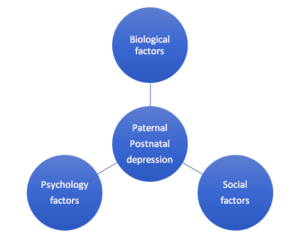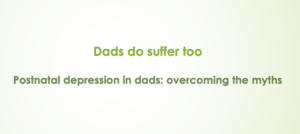This article provides a comprehensive overview of the postnatal depression in dads. This includes possible causes, risk factors, diagnosis, and treatment. This is discussed in the light of available scientific evidence.
Postnatal depression in dads a real illness or a media hype?
There is a common belief that Postnatal depression occurs only in women.
Research has shown that fathers also could suffer from Postnatal depression. When this happens to the dads, this is called Paternal Postnatal Depression (PPD).
At least 10% (i.e., 1 in 10) dads suffer from postnatal depression.
Fathers are more susceptible to develop PPD especially between 3-6 months after the childbirth. (Ref)
On the other hand, the rate of depression among men who are not fathers is 7-8%. (Ref)
This would indicate that men with PPD are affected as a result of becoming the father.
The rate of the PPD is even higher in the dads whose partners are suffering from postnatal depression (PND).
Another commonly occurring mental health conditions along with PPD is Obsessive Compulsive Disorder (OCD). Classic symptoms of postnatal OCD include obsessive thoughts of causing harm to the child and compulsive act of repeatedly checking if the child is safe and healthy. (Ref)
Why would postnatal depression happen to the dads?
One might argue that how a man can suffer from postnatal depression when he has not been pregnant or given birth? Therefore, he has not undergone hormonal and other bodily changes like his female partner.
We do not know exactly why postnatal depression occurs to the fathers. Therefore, more research is required in this area.
It goes without saying that, childbirth is a life-changing event for both the parents. This could be quite challenging and stressful at times, especially when you do not have adequate support.
However, researchers have shown that the following factors contribute to the Paternal Postnatal Depression:
Social factors:
1. Maternal PND
2. Poor marital relationship
3. Financial difficulties
4. Unplanned pregnancy
5. lack of support from family/ friends
Psychological factors:
Previous psychiatric illness, such as depression, anxiety, OCD, or others.
Biological factors:
1. Low blood testosterone level:
Low testosterone level is thought to be related to PPD.
Research has shown that the blood testosterone levels of the dads decline during pregnancy and post-childbirth period.
This occurs more commonly who stay with their partners and involved in the childcare, compared to those who stay single and do not assume parental responsibilities.
The level starts to decline during the pregnancy and stays for several months after the childbirth. (Ref 1, 2)
However, the exact mechanism of this temporary decline testosterone level is not clear. From an evolutionary perspective, it is thought that the low testosterone level helps men to develop a better bond with the child and show more compassion.
2. Low blood levels of estrogen, cortisol, vasopressin, and prolactin. (Ref)

What are the challenges in detecting PPD?
1. Lack of awareness: both among the fathers and healthcare professionals
2. Lack of screening strategies and care pathways both in the Maternity Units and in the Primary care.
3. Men are less likely to disclose mental health conditions and seek help.
What are the impacts of PPD?
Addressing Postnatal depression in dads is vital as this could lead to the following:
1. Quality of life: dads might have low self-esteem, social isolation, loss of jobs and could also have drug/ alcohol abuse.
2. Maternal health: when the fathers suffer from postnatal depression, they are less likely to provide adequate emotional support to their partners. Sometimes, this could lead to aggressive behaviour and intimate partner violence.
3. Relationship breakdown/ divorce
4. Impact on the child: there is increased risk of insecure attachment (Ref 3) and twice higher risk of behavioural problems, hyperactivity disorders and psychiatric illness of these children. (Ref 4)
5. Healthcare cost implications
What are the symptoms of Paternal postnatal depression in dads?
Every dad has different symptoms, so healthcare professionals should listen and acknowledge the individual journeys.
Common symptoms of depression:
– persistent low mood
– loss of interest in life, low energy
– difficulty in sleeping/ insomnia
– poor concentration
– sense of worthlessness
– suicidal thoughts
Uncommon presentations of postnatal depression in dads:
Sometimes, dads with postnatal depression do not show usual symptoms of depression. (Ref 5)
As a result, the diagnosis becomes very challenging.
The uncommon symptoms are as follows:
– persistent irritable mood, fear or anger than sadness
– drug/ alcohol/ abuse
– sexual promiscuity
– withdrawal from social interaction (such as staying late at work or away from family)
– intimate partner violence

What are the treatments of postnatal depression in dads?
Fathers can fully recover from postnatal depression with proper treatment, care, and support.
The treatment depends on the severity of the conditions.
The treatment options are:
1. Supportive care: mild cases might not need any specific treatment.
2. Psychological treatment, such as CBT or on-line computer-based self-help programmes
3. Antidepressants
Local self-help groups/ Peer support could play an important part during the process of recovery.
How could the fathers be better supported during pregnancy/ postnatal period?
1. Helping them understand their role: providing information on
– how to support their partners
– look after themselves
– what to expect during pregnancy, childbirth, and parenting
2. Role of the Maternity Units:
Dads should feel welcomed and involved in the care of their partners. Healthcare professionals should encourage dads to discuss their fear and concerns. This would reduce anxiety and enhance their confidence as a parent.

How is the postnatal depression in dads diagnosed?
Screening for PPD:
There is no universal screening policy for postnatal depression in fathers. World Health Organisation (WHO) recommends screening for the mothers only, not for the fathers
Some research studies have shown the importance of routine screening for depression in both parents during pregnancy and post-childbirth period.
This is especially important if there is the mother is having PND.
Screening tools for the postnatal depression in dads
– Edinburgh Postnatal Depression Scale (EPDS)
This was originally devised to detect PND of the mothers. However, this has been widely used to detect PPD with high detection rate.
– The Gotland Male Depression Scale (GMDS)
This could be better in detecting PPD. But more research is needed in this area.
Conclusion
At least 1 in 10 dads suffer from Postnatal depression. This could have an impact on the quality of life of the father, mother, marital relationship, and the child.
PPD could also have huge coast implication for the healthcare sector too.
More awareness and support for the dads are required all across the world.
More investment is also needed for the scientific research in this field.
Reference
1. Fleming A, Corter C, Stallings J, Steiner M. Testosterone, and prolactin are associated with emotional responses to infant cries in new fathers.
2. Horm Beh. 2002; 42(4): 399–413. 21. Wynne-Edwards K. Hormonal changes in mammalian fathers. Horm Beh. 2001; 40(2): 139–145.
3. Kim P, Swain JE. Sad Dads: Paternal Postpartum Depression. Psychiatry (Edgmont). 2007;4(2):35-47.
5. Heifner C. The male experience of depression. Persp PsychCar. 1997; 33(2): 10–18.


